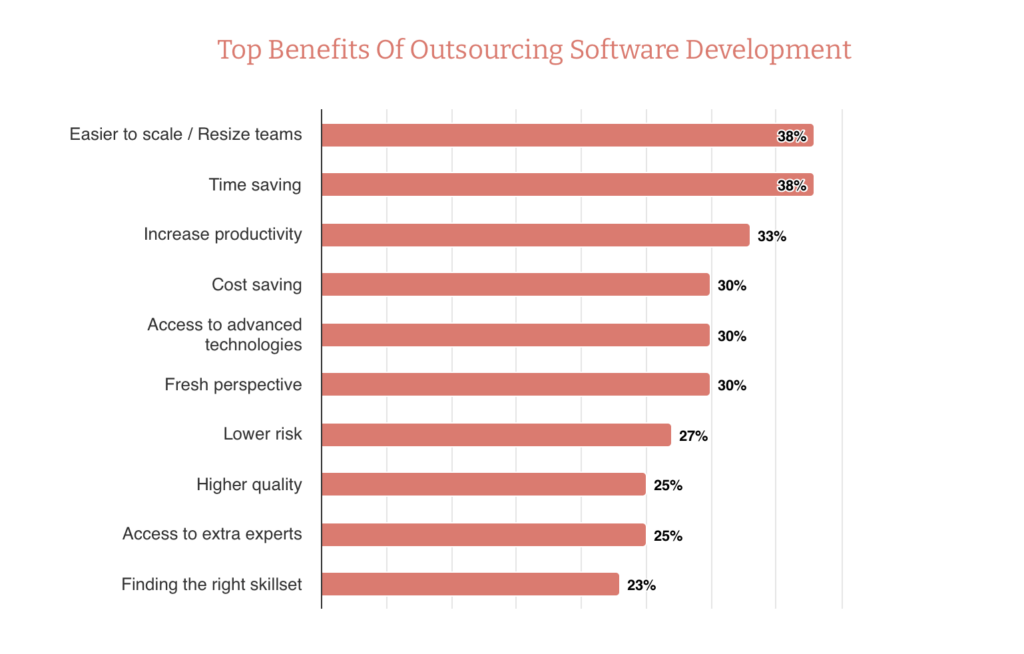Are you contemplating developing your custom software but find yourself uncertain about the benefits it brings to the table? Or you’re among those who currently have an off-the-shelf application, but are frustrated with limited features and unaligned workflows with your business.
Stay assured, as you’ve come to the right place to find the answers to any uncertainties or questions you may have.
At Mallow, we have a proven track record of delivering tailored software solutions and understand the intricate needs of businesses. Our commitment to empowering people to make informed decisions has been the cornerstone of our success. While our core focus remains on custom software development, our unwavering dedication to providing objective guidance is why businesses continue to choose Mallow as their preferred development partner, time and time again.
After going through this article, you will learn how outsourcing can significantly reduce costs, provide access to specialised expertise, accelerate time-to-market, improve scalability, and reduce risks. The article delves into real-world case studies and success stories to illustrate these benefits. You will also be equipped with insights into the challenges and considerations of outsourcing and how to select the right partner.
What do real people say about custom software development using outsourcing?
Custom software development through outsourcing offers a comprehensive solution for businesses looking to create tailored applications that align perfectly with their unique requirements. By partnering with external development teams or firms, companies gain access to a global pool of specialised skills and expertise, often at a fraction of the cost of in-house development. This approach allows for flexibility in scaling resources, faster time-to-market, and a significant reduction in development costs.

Outsourcing partners often bring industry best practices and rigorous quality assurance processes to the table, resulting in high-quality software solutions. Custom software development through outsourcing offers businesses a competitive edge, as it ensures that their applications are finely tuned to their needs and market demands. Between 2022 and 2023, the anticipated growth rate for software development outsourcing stands at a robust 70%.

7 key benefits of outsourcing your custom software development

1.
Cutting costs and boosting value
Outsourcing custom software development can significantly reduce your project’s overall costs. Companies often choose to outsource because it allows them to access a global talent pool with lower development costs in offshore or nearshore locations. This cost-saving aspect is especially advantageous for all sizes who are keen on their budget.
By outsourcing, you can minimise expenses related to hiring and retaining in-house developers, as well as investing in infrastructure and software licences. You’ll have the opportunity to choose from a range of pricing models, such as fixed-price or time-and-materials, making it easier to align your budget with your project’s specific needs.
2.
Unlock a large pool of developers from across the world
One of the most compelling reasons to outsource custom software development is the access to specialised skills and expertise. External development teams or firms often bring a wealth of knowledge and experience to the table, including proficiency in various programming languages, frameworks, and industry-specific solutions.
They stay up-to-date with the latest technologies, making them well-equipped to tackle even the most complex projects. This access to diverse skill sets and domain-specific expertise ensures that your custom software solution will be finely tuned to your business needs and the demands of your industry. Whether you require AI and machine learning capabilities or GDPR, an outsourcing partner can provide the specialised skills essential for your project’s success.
3.
Accelerate your time to market
Outsourcing custom software development can significantly accelerate your project’s time-to-market. External development teams are often well-versed in efficient development practices and have streamlined workflows that are honed through years of experience. They can hit the ground running, reducing development cycles and ensuring quicker product launches. This speed is particularly advantageous in highly competitive industries where being the first to market with an innovative solution can make a substantial difference.
Outsourcing teams can often handle tasks in parallel, reducing bottlenecks and speeding up the overall development process. They tend to have established quality assurance practices that help identify and resolve issues swiftly. Ultimately, outsourcing can help you get your custom software into the hands of your users faster, allowing you to start realising the benefits of your investment sooner.
4.
Maintain flexibility to scale up and down your team depending on current needs
Outsourcing offers unmatched scalability and flexibility for your custom software development projects. You have the freedom to scale your development team up or down based on project requirements, providing you with the adaptability needed to navigate fluctuating workloads or evolving project needs. This means you can efficiently allocate resources without incurring the costs and administrative complexities of hiring and managing in-house staff.
Whether your project requires a larger team during the development phase or a smaller team for ongoing maintenance, outsourcing allows you to quickly and cost-effectively adjust your development resources. This flexibility ensures you can adapt to changing business conditions, market dynamics, and customer demands. Outsourcing partners often have a vast network of skilled professionals they can tap into when necessary, further enhancing your ability to scale your team to meet your project’s unique requirements.
5.
Reduce the time and risk that comes with building an application
Outsourcing custom software development can be an effective way to mitigate project risks. When you partner with a reputable outsourcing firm, you share the responsibility for project success, reducing the burden on your internal team. These outsourcing providers typically have well-established processes and workflows, quality assurance measures, and risk management strategies in place. They can help identify and address potential issues early in the development process, preventing them from becoming major challenges later on.
Outsourcing firms often have experience in managing various types of projects and are quick at adapting to changing project requirements. They can help you navigate potential pitfalls and uncertainties, increasing the predictability and success of your project. By collaborating with an outsourcing partner, you can leverage their expertise and resources to manage risks effectively, ensuring a smoother and more reliable development journey.
6.
Quality assurance
Outsourcing can be a game-changer when it comes to quality assurance in custom software development, especially if your in-house team lacks the expertise and resources to handle it effectively. Reputable outsourcing firms have honed their quality assurance processes to perfection. They rigorously test software through methods like unit testing, integration testing, functional testing, and performance testing. Prioritise security testing to uncover vulnerabilities and safeguard sensitive data, providing an added layer of protection.
Opting for outsourcing gives you access to a tried-and-true quality assurance framework, which substantially decreases the risk of defects, errors, and post-launch issues. This approach ensures that your software aligns with your project requirements and complies with industry standards and best practices, fostering a high-quality product. By partnering with outsourcing experts in quality assurance, you boost user satisfaction and reduce the need for extensive bug fixes and updates post-launch, ultimately contributing to a smoother and more reliable software development journey.
7.
Allow your team to completely focus on their core competencies
One of the most compelling advantages of outsourcing custom software development is the ability to focus on your core competencies. When you delegate the technical aspects of your project to an external development team, your in-house team can concentrate on what they do best—the core business activities that drive innovation, growth, and competitiveness.
This focus can lead to improved operational efficiency and effectiveness, as your team can dedicate more time and resources to strategic planning, customer engagement, and business development. It also allows your business to explore new opportunities, invest in research and development, and drive innovation in your industry.
By outsourcing non-core tasks, you free up valuable internal resources and reduce the strain on your team, allowing them to work on initiatives that directly contribute to your business’s success.
Some challenges of working with custom software development companies
Let’s consider a startup company that is in the early stages of its business and is primarily focused on building a customer base. The company needs a CRM tool to manage customer contacts, track interactions, and streamline their sales and marketing efforts. However, they are working with limited capital and want a cost-effective solution.
Custom software development can be time-consuming, and the startup might need a CRM solution quickly to manage their growing customer base. Off-the-shelf CRM tools can be implemented much faster.
Also, if your organisation operates with highly tight budget constraints, going with custom software development might not be a feasible option. Using affordable off-the-shelf solutions might be more feasible.
When going with outsourcing for developing your custom software application might not be the best fit?
Custom software application development is a versatile solution, but there are scenarios where it may not be the best fit. Here are the situations:
- Simple, Low-cost projects – If your project is simple and can be accomplished with readily available off-the-shelf software, it might not justify the time and expense of custom development.
- Time to market – Time to market can indeed pose a significant challenge when outsourcing custom software development. While outsourcing offers numerous benefits, such as access to specialised skills and cost-efficiency, it also comes with its own set of considerations that can impact project timelines. Communication hurdles, varying time zones, cultural differences, and coordination among multiple teams can sometimes lead to delays in the development process. Furthermore, finding the right outsourcing partner, negotiating contracts, and aligning expectations can consume additional time. To mitigate these challenges, it’s essential to invest in thorough due diligence when selecting an outsourcing firm, establish clear communication channels, and set realistic project timelines.
- Lack of time – If your in-house team lacks the technical expertise to manage and oversee outsourced development, it can lead to challenges in project management. When your in-house team lacks the technical expertise to oversee outsourced development, project management can become challenging. In such cases, it’s crucial to ensure that the outsourcing team you hire has the necessary capabilities to manage the project effectively, maintaining open communication and transparency to bridge the expertise gap and deliver successful results.
How to hire the right application development team
At this point, you’ve gained a comprehensive understanding of the key advantages of outsourcing custom application development and how these benefits can elevate your project. As you delve deeper into the process, a pressing question arises: How can you select the ideal application development team to bring your vision to life? It’s imperative to explore the various factors that demand your attention when it comes to making the right choice for your application development team.
Check out this article on how to hire the right application development team to carry out your hiring process efficiently.
Still unsure with your next move? Feel free to reach out to our team.
Author
Jagajeevan
Jagan is a successful project manager with over 8 years of experience at Mallow Technologies. With his strong leadership skills and meticulous approach to project management, Jagan has consistently delivered successful outcomes for a diverse range of client engagements. Throughout his career, Jagan has been responsible for overseeing complex projects from inception to completion. His excellent communication skills and collaborative approach enable him to understand client requirements, effectively communicate project progress, and address any concerns that may arise. Outside of his work, Jagan is an avid reader and finds solace in the world of books during his free time. He believes in continuous learning and stays updated with industry trends, management methodologies, and leadership practices through his reading habits.



